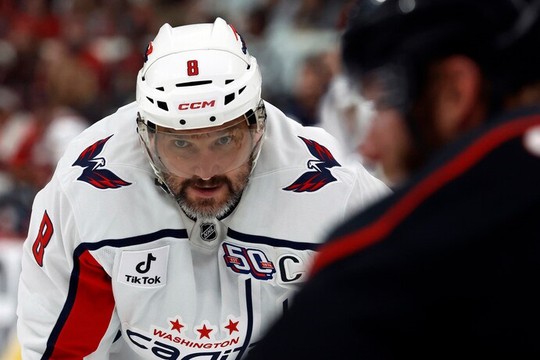When NHL players return to the Olympics for the first time since 2014, Alex Ovechkin won't be among them.
Photo: AP
Alex Ovechkin won’t be in the 2026 Milan-Cortina Olympics.
Here’s an athletic-political salad: The International Olympic Committee’s outgoing chief, Thomas Bach, has said, “If politics decides who can take part in a competition, then sport and athletes become tools of politics.” And yet his organization banned Russian and Belarusian athletes from the 2024 Paris Summer Games and the upcoming Winter Olympics in Milan and Cortina, Italy.
The hypocritical nature of all that is old hat for Bach, who is fluent in four languages, each of which he can speak out of both sides of his mouth. It’s a neat trick, even for a short-timer. His tenure is up in a month. Maybe Kirsty Coventry, the Zimbabwean Olympic swimmer who will take his place, can more deftly move the IOC through the geopolitical waters it must inhabit, whether it wants to or not, writes ‘The Washington Post’.
Which brings us to Alex Ovechkin and the Russian men’s hockey team.
Put all of the above aside and think about what the 2026 Olympic men’s hockey tournament could be. The NHL completely fabricated something called the 4 Nations Face-Off, and damned if it didn’t deliver. Americans threw down gloves for an American cause, the Canadians responded with haymakers of their own, Sweden and Finland played their part, and it was clear that having the best hockey players back in the Olympics — where they hadn’t skated since 2014 — was going to be appointment television, regardless of what time that appointment would be.
Throw Russia into the mix, and what a tournament! Ovechkin, as the 40-year-old graybeard who recently became the NHL’s career goals king, making one last run on the international stage with Nikita Kucherov, Artemi Panarin and Evgeni Malkin against Sidney Crosby, Connor McDavid and the rest of the Canadians? And then against Auston Matthews, Connor Hellebuyck and the United States? More, please.
Except Tuesday, the IOC upheld its decision that — in the wake of Russia’s invasion of Ukraine, a years-long humanitarian slog — Russian and Belarusian athletes would be banned from Milan. But certain individual athletes could make the case that they did not support the war or the war effort. Then those individuals — but not teams — would be allowed to compete without national uniforms or national anthems.
“The IOC Executive Board recommendation from March 2023 with regard to teams of athletes with a Russian passport remains in place,” the IOC wrote in its announcement. “It is based on the fact that, by definition, a group of Individual Neutral Athletes cannot be considered a team.”
Look, this isn’t a call for the IOC to reinstate the Russian men’s hockey team — and Russian athletes in general — because it would make for better competition (which it would). This is a call for some consistency. Either you’re banning Russians because of Putin’s actions in Ukraine — which is completely defensible — or you’re not.
Listen to Bach, in a 2023 speech in Germany, when the IOC was threading the needle to allow some Russian athletes but not the Russian team to compete in Paris. He began with the words in the first paragraph above, about sport and athletes becoming tools of politics.
“It is then impossible for sport to transfer its uniting powers,” he said. “We must be politically neutral but not apolitical. We know well that politics rules the world. We know well that our decisions have political implications, and we have to include that in our thinking.”
But banning some Russian athletes because they are a “team” and permitting others because they are not? Is that somehow caught up in world politics?
Ovechkin, of course, lands in a peculiar place here. The Washington Capitals’ captain and icon passed Wayne Gretzky as the NHL’s leading goal scorer last month. The coming NHL season is likely to be his last. He has transformed hockey in the American capital and brought so much joy along the way.
And yet his relationship with Putin has followed him. He has actively supported the Russian president in his campaigns for reelection. Ovechkin’s Instagram avatar still features him posing with Putin. He faced scrutiny for his stance when the Ukraine war began. He has mostly skated since.
A great world would include peace between Russia and Ukraine — and no more suffering. On a scale that’s itty-bitty by comparison, a great world would include an Olympic hockey tournament with all the best players from every corner of the globe available.
But for that world — that sporting world — to happen, the IOC would have to decide whether it’s political. More than that, it would have to determine how to apply its assessment of its place in a political world evenly, treating all athletes from affected countries the same, whether they compete for themselves or for their team.
read more in our Telegram-channel https://t.me/The_International_Affairs

 10:25 01.06.2025 •
10:25 01.06.2025 •























